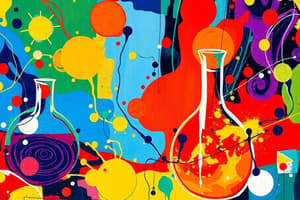Podcast
Questions and Answers
Boyle's law can be derived from the Ideal Gas Law equation (PV = nRT)
Boyle's law can be derived from the Ideal Gas Law equation (PV = nRT)
True (A)
Chemists encountered difficulties in developing the Ideal Gas Law due to the existence of intermolecular forces
Chemists encountered difficulties in developing the Ideal Gas Law due to the existence of intermolecular forces
True (A)
The Ideal Gas Law equation is only used when dealing with ideal gases
The Ideal Gas Law equation is only used when dealing with ideal gases
False (B)
An ideal gas is a real gas that perfectly follows the Ideal Gas Law equation
An ideal gas is a real gas that perfectly follows the Ideal Gas Law equation
The Ideal Gas Law equation (PV = nRT) accounts for the constant, random, straight-line motion of gas molecules
The Ideal Gas Law equation (PV = nRT) accounts for the constant, random, straight-line motion of gas molecules
ما هي خاصية مفصولة عن خصائص غاز مثالي؟
ما هي خاصية مفصولة عن خصائص غاز مثالي؟
ما هو الحالة التي يكون فيها سلوك الغاز مثاليًا؟
ما هو الحالة التي يكون فيها سلوك الغاز مثاليًا؟
ما يحدد سلوك الغاز المثالي وفقًا للقانون الغاز المثالي؟
ما يحدد سلوك الغاز المثالي وفقًا للقانون الغاز المثالي؟
ما هو التأثير الرئيسي للضغط على سلوك الغاز المثالي؟
ما هو التأثير الرئيسي للضغط على سلوك الغاز المثالي؟
ما هو التأثير المباشر لتبادل طاقة بشكل كبير على سلوك غاز مثالي؟
ما هو التأثير المباشر لتبادل طاقة بشكل كبير على سلوك غاز مثالي؟
Flashcards are hidden until you start studying
Study Notes
Limitations of the Ideal Gas Law
- The ideal gas law is not perfect and doesn't accurately describe the behavior of gases under all conditions.
- The law is useful for predicting the behavior of gases under most commonly encountered conditions.
- The ideal gas law may not accurately describe the behavior of gases at:
- Low temperatures (small molecular kinetic energy)
- High pressures (little space between molecules)
- Under these conditions, the behavior of gases becomes increasingly like that of liquids.
Ideal Conditions for the Ideal Gas Law
- The ideal gas law is most accurate when:
- Temperatures are high
- Pressures are low
- Under these conditions, the kinetic energy and spacing between molecules are both large, allowing for the neglect of:
- Miniscule attractive forces
- Molecular volume
Studying That Suits You
Use AI to generate personalized quizzes and flashcards to suit your learning preferences.




